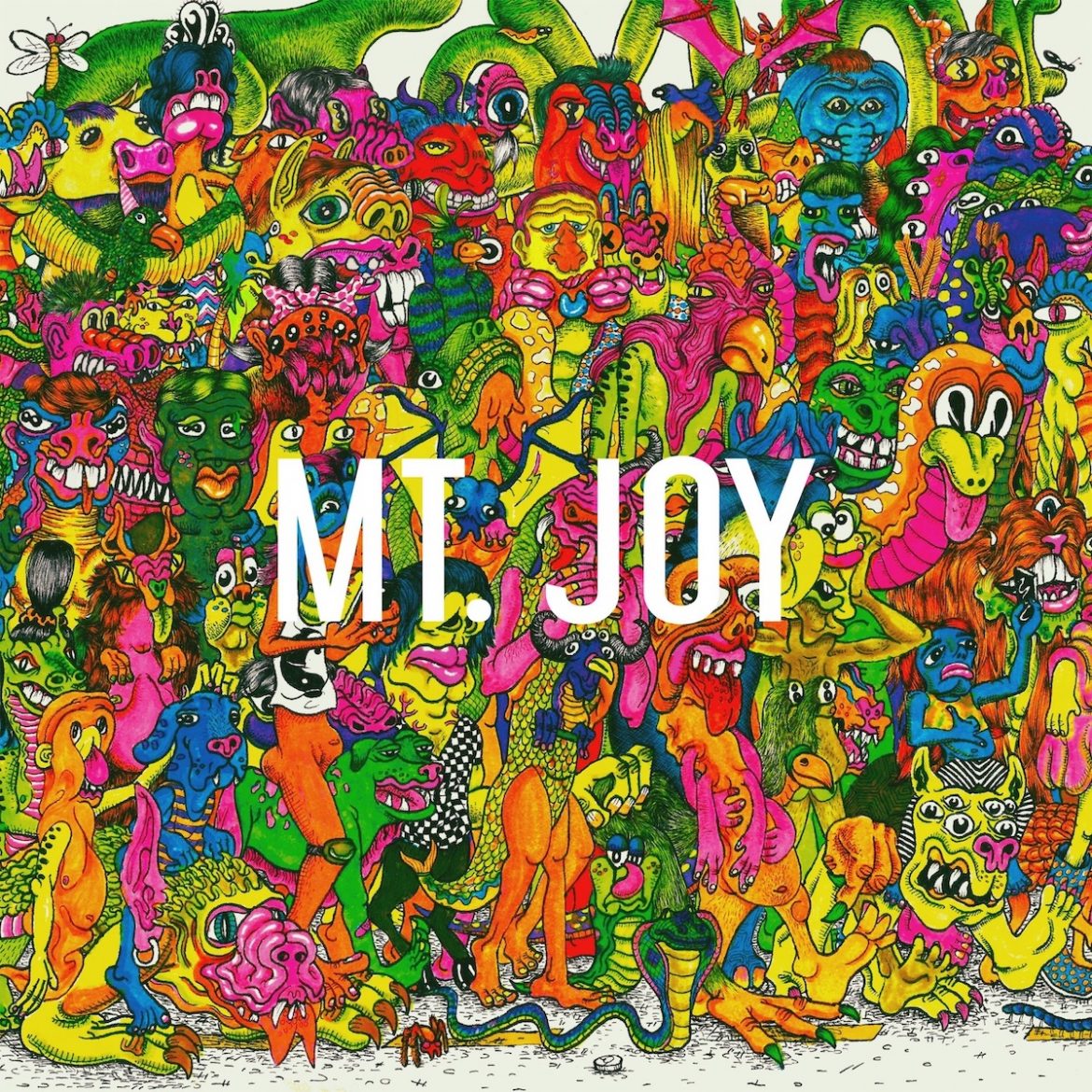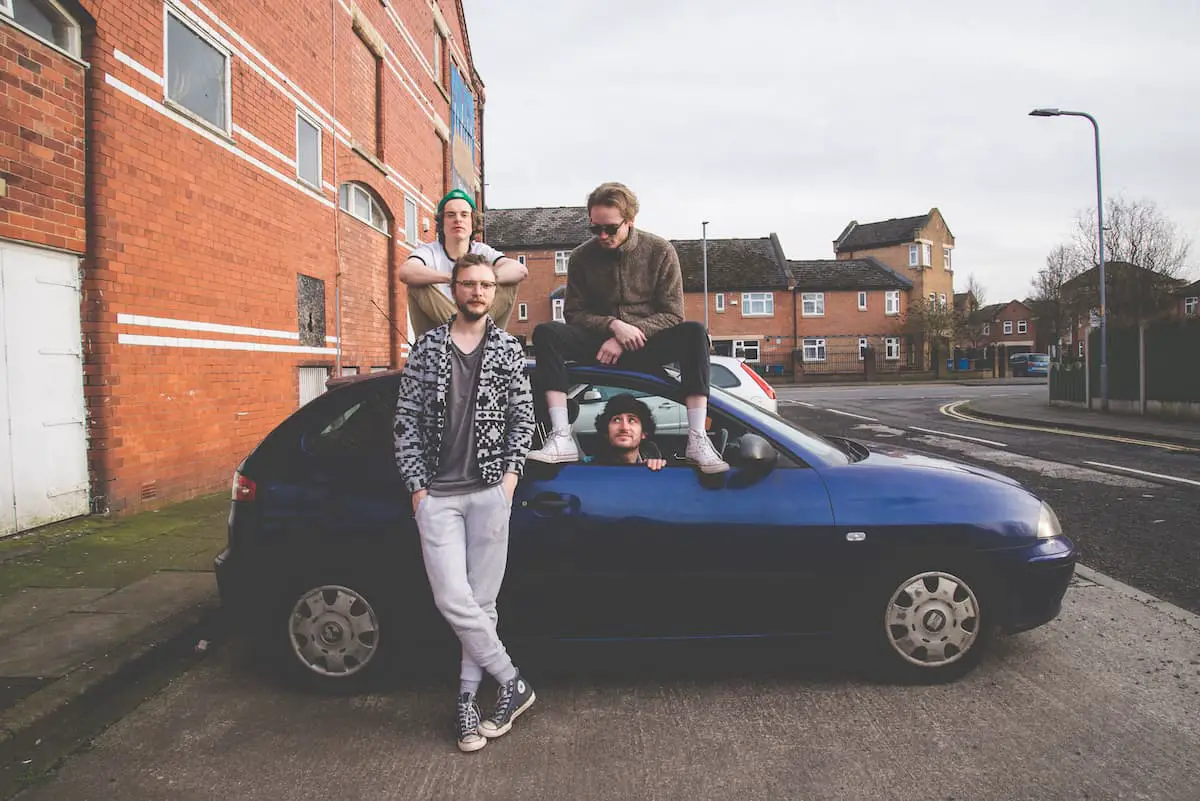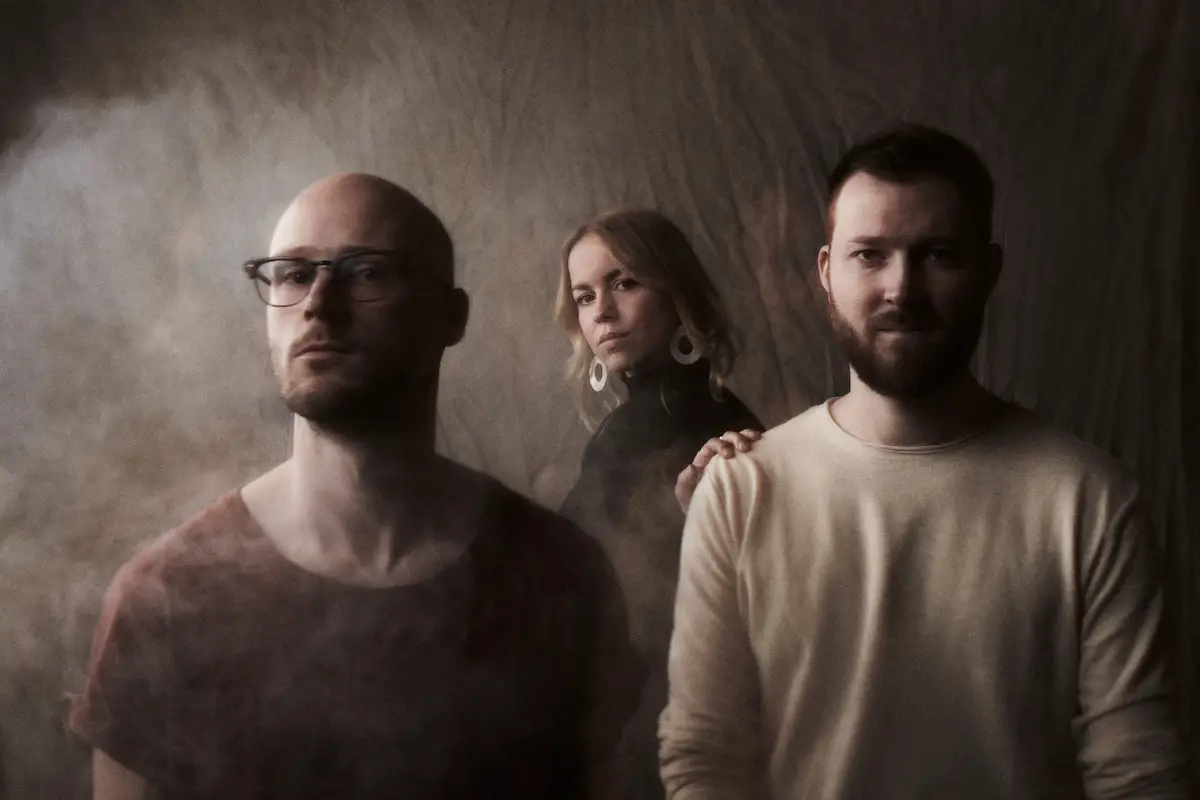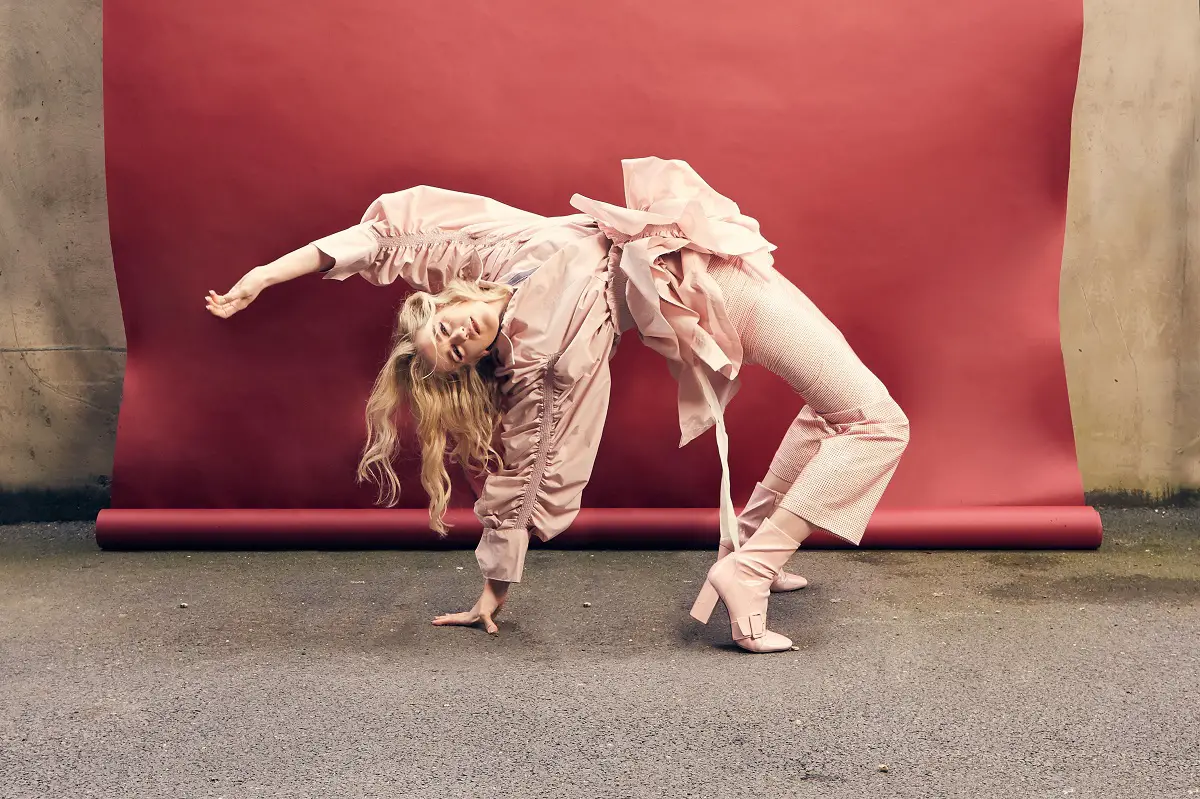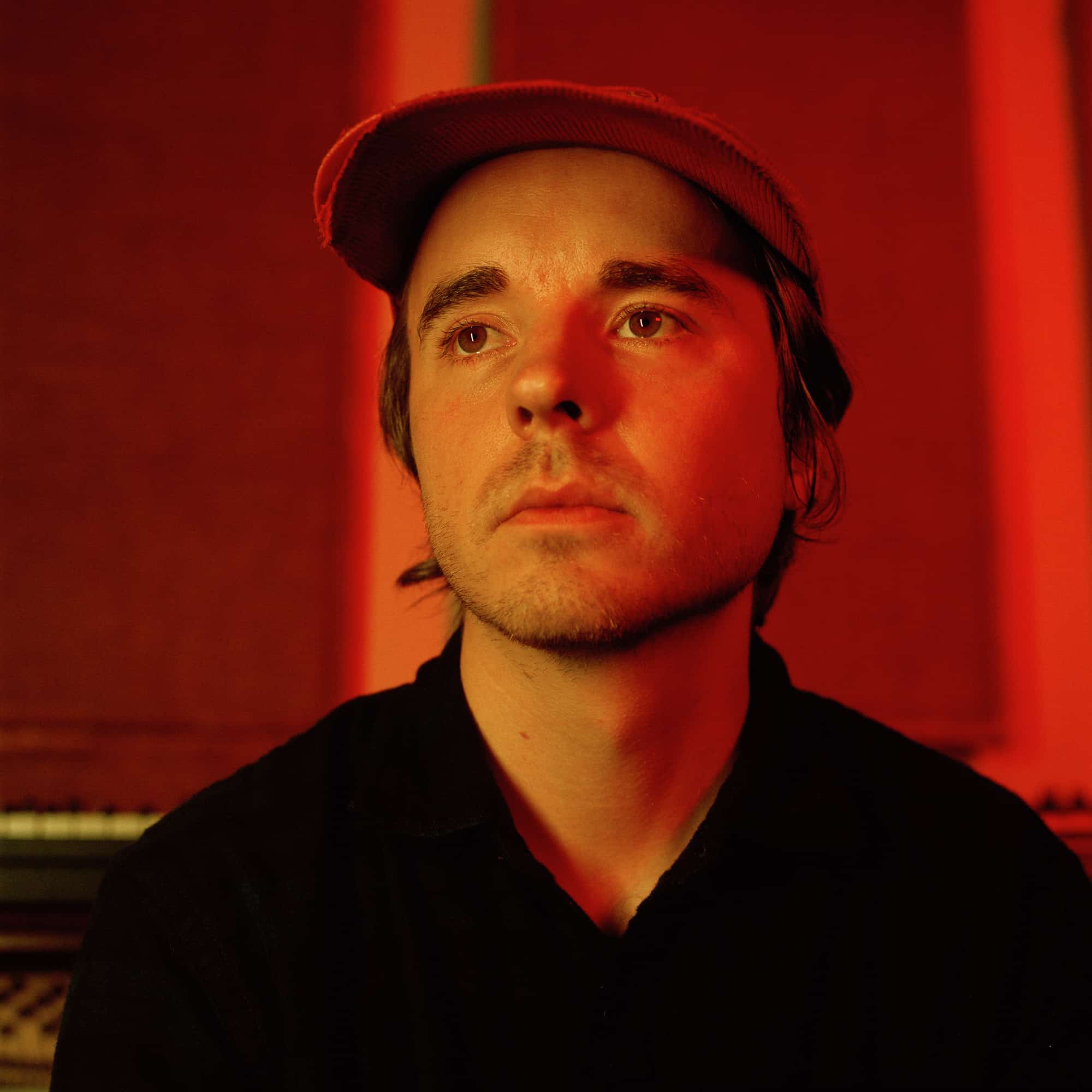Mt. Joy’s Matt Quinn dives deep into the band’s sweet n’ spicy third album ‘Orange Blood,’ lets us in on some of their inside jokes, and reflects on that special sauce that gives Mt. Joy their zesty, one-of-a-kind kick.
Stream: ‘Orange Blood’ – Mt. Joy
When it comes to (musical) taste, Mt. Joy are equal parts sweet and spicy.
They’re the hot honey sauce (or “honey hot,” as Matt Quinn would say) that makes everything better – anthems, ballads, extended jams, sandwiches, salads… you name it! The Philadelphia indie rock band have spent the past six years now on what has proved to be a never-ending journey of self-discovery: Each of their three studio albums has unlocked something new in terms of who Mt. Joy are and who they can be. It’s a process that promises to continue repeating until they grow tired or get bored, neither of which is likely to happen any time soon.
“It still feels like the beginning in a way, because I feel like our powers are growing,” Mt. Joy’s frontman Matt Quinn says, wearing an undeniable “proud dad” kind of smile. “I feel like we’re starting to get a firm grasp of who we are and what we’re capable of. I feel like we have a little bit of our own sauce, and I don’t know how we got here, but it just feels obvious at this point.”
It’s said that a band truly finds themselves on their third album, and that old adage seems to hold true for Mt. Joy, whose musical, lyrical, and sonic potential are at an all-time high, having been fully realized on their recently released LP. A record of deep grooves and feel-good jams, inner reckonings and raw revelations, Orange Blood is a sweet n’ spicy triumph: A soothing, spirited, honest and fun album inviting us to zoom out and reconnect to what matters most to us.
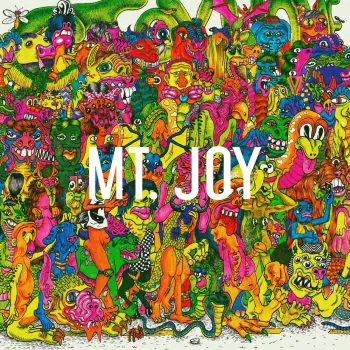
Oh, I like that feeling when it’s all out
We’re all so human with our guards down
Free from the chains of our ego
The pain’s what makes us equal
Yes, and I know that worry eats at your mind
Let the desert sun decorate time
As we go, driving on the interstate
Acid took us on a date
Orange blood dripping from the sun
Tell me you’re the one
Leave the record on, singing every song like
Ohh-oh, oh-oh-oh, oh
– “Orange Blood,” Mt. Joy
Rather than being a form of musical escapism – as so many records turn out to be – Orange Blood implores us to lean into our lives, to embrace every moment, and to see the beauty all around us, even during a global pandemic. Out June 17, 2022 via Island Records, Orange Blood is Mt. Joy’s first major label release and a truly remarkable follow-up to 2020’s sophomore LP Rearrange Us, which found them embracing their signature sound while plunging headfirst into the deep end of life.
“Rearrange Us is an exceptional follow-up to Mt. Joy’s self-titled 2018 debut,” I wrote in Atwood Magazine‘s 2020 feature. “The forty-minute record finds Matt Quinn, Sam Cooper, Sotiris Eliopoulos, Jackie Miclau, and Michael Byrnes building upon their charismatic psych-tinged rock sound: Three years of nearly nonstop touring has turned the band into a dynamic, sleek machine – a truth that transfers onto their record through stunning emotional overhauls and dazzling instrumental arrangements, solos, highs, and lows.”

Whereas this admittedly impressive second record was recorded over just a few free weeks in between the band’s rigorous tour schedule, Orange Blood is the product of time, patience, and practice.
The five-piece returned to their native Philadelphia and worked with longtime producer and collaborator Caleb Nelson to craft a record brimming with warm light, a hopeful energy, and plenty of space. Mt. Joy are still the tight indie rock powerhouse fans have come to know and love, but every song on their new album has its own distinguishable character, from the smoldering churn and uplifting glow of the title track “Orange Blood,” to the high-octane energy of “Evergreen,” to the dramatic and charming positivity of lead single “Lemon Tree,” to the tongue-in-cheek, grin-inducing “Johnson Song,” and the passionate, heart-on-sleeve ache of “Bang” and the tranquil, life-affirming finale, “Bathroom Light.”
So, come on, baby, let’s do this right
I think I like falling in love in the bar bathroom light
I don’t question it, I don’t mess with it, I just go, go grab it
Tell your friends, tell your ma that you love who they are
‘Cause someday we must return the movies in our brains
And these moments we can’t fake
Yes, the angels never leak the expiration date
– “Bathroom Light,” Mt. Joy
In listening to Orange Blood, one gets the sense that Mt. Joy have opened themselves up, more so than ever before, to allowing the fullness of life to flow through their music: The good, the beautiful, the silly, the funny, the bad, the ugly, all come to together on a record of humble optimism and heartfelt perseverance. This is Mt. Joy at their most tender and at their most jarring – and true to form, sometimes both of those qualities manifest in the same song, as is this case on the album’s stunning penultimate track, “Ruins.”
For Matt Quinn and his band mates, this album captures who they are at their core: Honest and open, a balance between free-spirited and painfully cynical. “Orange blood is the light that rises each morning and decorates our world, regardless of what’s happening in your world,” Quinn explains. “We’re all connected by this energy and we really are so important to each other despite the forces that divide us. My dream for this record is that it gives people a chance to be present and connect with something outside of the daily doom scroll.”
To their credit, Orange Blood is the most “Mt. Joy”-like Mt. Joy record Mt. Joy have ever made.
It’s a title that will surely hold until their fourth LP, and then their fifth LP, and so on. That never-ending journey of self-discovery has proved to be one of Mt. Joy’s best qualities, because this band is only getting better with time.
“I just want to be able to make whatever we do and like whatever we want to make, and that feels really freeing,” Quinn says.
Reconnect with Mt. Joy in our intimate, in-depth interview below, where Matt Quinn discusses the circumstances around Orange Blood, lets us in on some of the band’s inside jokes, and reflects on that special sauce that gives Mt. Joy their zesty, one-of-a-kind kick. You can call it “honey hot” or “hot honey”; either way, this band have never tasted hotter, sweeter, and spicier than they do right now.
— —
:: stream/purchase Orange Blood here ::
A CONVERSATION WITH MT. JOY
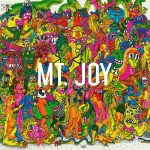
Atwood Magazine: Matt, we have a habit of reconnecting every two years or so. We last spoke around the very beginning of the pandemic in mid-2020. How have you been since then?
Matt Quinn: You know, I guess I’ll, you know, probably like for everyone else… A lot has changed in terms of Mt. Joy world, just really a lot of working on this record and kind of made that our world during the pandemic which was nice. It was nice to have something to like, I think a lot of people took up like making bread or yoga or something like that, but for us, it was easy to just sort of dive deeper into recording and writing and, yeah, I mean, it’s… I guess, I guess things have gotten a lot better, we’re out playing shows to non-socially distanced humans and, I feel like the world is steadily getting crazier, so it’s hard to say that with your chest, that things are gotten a lot better, but, in terms of Mt. Joy, I think it’s fair to say things have… Things have turned for the better.
So the band was your pandemic hobby, over the past couple years.
Matt Quinn: Oh, for sure. Sam and I moved back to Philadelphia, which I think I told you, I think I had just moved back to Philly, maybe, when we spoke last. We moved back and we rented a barn. I don’t know if I had, it probably wasn’t, I don’t know, hard to remember exactly two years ago, but we rented a barn on the outside of Philadelphia that we literally just found on… Either I think Craigslist or Zillow, I can’t remember, but we found this one was renting out a barn on her property and it wasn’t prohibitively expensive, in the, against the run of like getting a practice space or something and so it was really cool, we brought all our stuff there, and just treated it like, like a job, you know, which, you know, was good, like you said, because of the sort of giving us something to do, sort of a discipline to work on. And yeah, really went there every day and just rode and played and tried to like, make it feel a little less like official, you know, I think that’s something I struggle with. I like to be creative when there’s not a shot clock and it felt like with the barn, we could just go there and just make stuff for the joy of making things and, and then sort of, have the time and space ’cause we weren’t touring as much to sort of pick apart the ideas and, and really, this record was about just finding the 10 best ideas and whittling them down and into their best form, I guess.
Orange Blood feels like an album that was made in a barn.
Matt Quinn: [chuckle] It was more of a demo spot, but a couple of the tracks, “Evergreen,” the song “Bang”… and I might be missing one. For “Evergreen,” we ended up wanting these sort of stadium drums, and the barn had a big room and we just set up mics in the barn and recorded those drums in the barn, which was really cool. And then “Bang” was a performance on acoustic guitar and it felt like the room mattered for that. That song was recorded as a live take in the barn, so that’s cool. It’s cool to feel like it made the record, because it was such a big part of the record.
It feels like you guys really leaned into your inner jam band, Grateful Dead sells with this record, there's such a freedom to it. Which, I hope speaks to what you were talking about earlier with the trying to find balance between creativity and rules. Can we talk a little bit about that freedom that you guys took and the time that you had to kind of explore and you know... What the mentality was there?
Matt Quinn: I think there’s been a bit of a shift. Not that we weren’t doing that stuff before, but I think we realized, that we’re probably, I don’t know, I don’t want to sell us short, but we’re not really the band that’s gonna have the chart number one seeking single, and we’re gonna fight with Harry Styles for the top spot all summer. And we have to find this song that fits in all of the right boxes that, whatever the chart is asking for or whatever. I think we realized that really our thing is working on ideas and then sitting with them long enough to be sure of what we think is the stickiest, in terms of stuff you can’t get outta your head or stuff that you keep coming back to when you pick up the guitar, and that’s the freedom I think we feel. People have really, in a beautiful way, been drawn to what we do. I don’t think what we do has ever been really outside of what we like, which is really freeing in the sense that the formula is not super difficult or inauthentic. It’s just shift that we’re just trying to keep it as simple as that.
And I mean, the Grateful Dead, a lot of things are inspiring [to me] about the Grateful Dead, but one thing that inspires me about them is you sort of look back at their career – and this is gonna come off as a diss, but it’s not – but to me, they have this legendary catalog, but you look at the albums that they come from and there’s so many, even from Deadheads, there’s so many forgotten tunes in there, and it just seems like they had this… maybe some Deadheads would tell you that there’s no forgotten tunes and they’re all amazing. But I think the truth is you can kind of tell they were just making their shit and they had some real connects along the way. But they end up being this legendary band for, I know a lot of other reasons that there’re recorded music, but it does feel like, you know, we’re a band that can steal some of their magic, I think by just being ourselves.
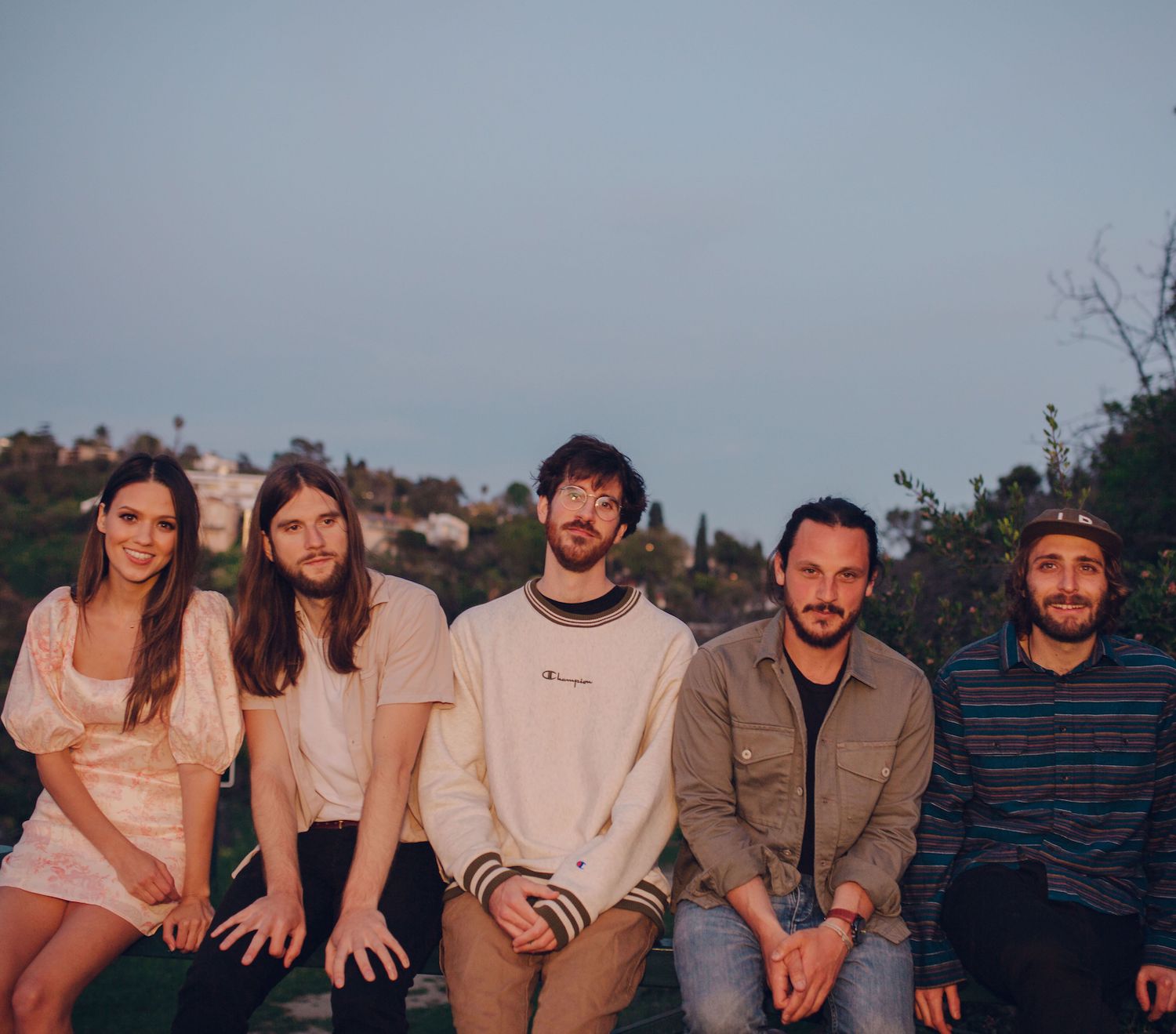
There's this impetus in the music industry today, where every single has to be a hit, you have to be going viral on TikTok in order to release music, etc. You need to be creating content all the time. I appreciate your willingness to resist that urge.
Matt Quinn: Yeah. Nothing against any other artist, I just think that we’re lucky. I don’t think that we’re the most virtuous; I think Mt. Joy, when given the opportunity to market our music, there’s two sides to that where you can either try to be totally focused on the music side and not willing to maybe compromise some of the “authenticity,” but with TikTok and with all that stuff, you can do all of that, but at the end of the day, you do have to market your music. So I do find that that’s a difficult line to cross.
It’s like this is our living and this is these people’s living. I think we’re lucky that our music seems to bring people to the party for the most part without having to have radio charting success necessarily. But at the end of the day, I’d be lying if I said that I don’t want to have a song that does well on the radio or something like that. I just feel like my whole dream is (and I think that a lot of the artists that I’m really inspired by even like, I don’t know, I even think about like a band, like Twenty One Pilots or something, ’cause I talk about this all the time and I don’t listen to their music a whole lot), but they made the radio kind of come to them in a lot of ways where they made kind of weird, wacky music that became sort of the pop, alternative radio and stuff like that.
I think there’s a world in which that’s kind of what Mt. Joy for me is shooting for. It’s not that we don’t want to have success at the highest levels; I think it’s just that we want people to realize that making honest music… I mean, look at the bands right now, there’s such a surge in ticketing for jam bands and stuff like that. I think people like what they like, and I often think that there’s an education that happens at radio that takes time.
This is coming from a Deadhead, so I’m sure I’ll be eliminated for this, but to me, I’ve never understood why a radio station would break their neck to play a certain BPM pop style, and leave off, you know, more contemplative music. When you see a Phoebe Bridgers, you see these people who break through at extremely high levels when given the sort of internet attention and care that she’s been given. And that’s not shade on Phoebe Bridgers, she’s done everything to deserve that and more, but I think there’s a thing where people do this shit. And I think there’s a world in which that can change, just ’cause sometimes you have a hit with Adele or artists like that, and you do occasionally have these ballads that break through on a playlist with J Balvin. Again, I’m not playing shade at anyone here, but you have these uptempo dance pop hits, which typically are what stick, at the top, at least in my view. But then we do have these ballads that break through that are like, a lo-fi drum kit away from being an indie rock song. It’s really hard to discern what the difference is there sometimes.
For us, at least for now, it’s just, make your shit. The TikTok thing’s a whole other conversation. I’m careful with my takes about TikTok because I think there’s a thing happening where we’re always living in these moments. And I wonder if it was a similar conversation about Instagram, Twitter, Facebook… I’m sure it was. And there is a bit of, you know, in this industry, I do feel a lot of pain from TikTok. I really do, but not in the way of, I don’t wanna use TikTok or I don’t think we can be… Like our band, I think is so funny, that I actually look at a TikTok as something that has some positives and we can figure out how to, you know, kind of onboard ourselves and be funny and be ourselves. But…
My thing with TikTok in terms of the, the downside is just that, I worry that if you channel music marketing into TikTok, it feels like this time around, and I echo the voices of people who have said this… I don’t think this is a unique thought, but I worry about the platforms for artists to get their music to people continually being homogenized. I think pushing that information all down the same pipe, and pointing to success there as proof that, that is the place to be found, I think is, at times a little disingenuous considering the randomness at which people go viral and whatnot. So that’s my thing with that.
I worry about the platforms for artists to get their music to people continually being homogenized.
There's a bit of a freewheeling aspect to Mt. Joy's music – and whoever has been making your album artwork is just killing it on that side, too. I can spot a Mt. Joy artwork from miles away.
Matt Quinn: We’ve just kept going with the hot hand, which is Steve Girard. He made our first, he made all three of our album art pieces, in addition to some single art, I think for the first and second album, he made some single art as well. Like he made the Buffalo that we used for the “Astrovan” single, and some other things as well. He was a friend of Sam’s from college and I vividly remember at the start, Steve’s such a huge part of what we do… I remember at the start of, Mt. Joy, we had this thought where we had these songs and I felt like we wanted to get to this point where we could get people to hear them and even get people like you to call. And then we were like, you know, what’s not gonna work is like a promo shot of like the two of us holding acoustic guitars or something… We were so certain that like, it was not about us, and I still sort of feel that. And I guess that’s another sort of issue I have with, you know… It’s really not in TikTok, in just social media in general, but I think Mt. Joy for me is like… I don’t know what percentage is about me, but it’s lower than a lot of other artists, whose name is in the thing.
I just want it to be about the music and about people’s connections to the songs, and obviously a lot of that is because it’s so personal that I just want it to be a little bit away from me. So we got Steve to draw these drawings and the idea originally was we were gonna do like a Gorillaz thing and Steve was gonna be the guy making these sort of characters. And that’s where the Buffalo came from! Ultimately we decided like it was A) literally ripping off the gorillas too hard, and B) unsustainable. But I remember going through some of his drawings and you just kind of knew immediately, like they’re literally doodles that he does! He has a sketchbook that we raided for the first album. And then this piece we commissioned and the last one we commissioned; he’s an incredible artist.

I want to dive into the music itself now. Starting off, how do you feel Orange Blood compares to Rearrange Us?
Matt Quinn: I think from my experience is really the only way I think I can compare them, which is like the, Rearrange Us experience was a get off tour, we had six weeks, the songs were like, kind of three quarters baked going in. And then we had to pull together an album with Tucker, who was amazing. But the time was a high intensity thing, where you didn’t have much time and you’re trying to piece together something over the course of two, three weeks and wrap it up, and a lot of stuff happens under that pressure. I think this record was just way more done at our pace, and we got it. I feel like it therefore really represents the thing we wanted to make in the beginning, whereas I think you make some compromises on a record where you’re a bit under a time crunch – and some of those are cool compromises, things that we wouldn’t have done maybe, but ended up agreeing to, because we were like, “You know what, leave it, it’s a cool accident,” or something like that, you know. And so that, to me, is the biggest difference.
And then sonically, I think we’ve just changed a little bit. We’ve gotten better as a band, I think in a lot of ways because of playing together more, and I think people have just taken that step forward. I hear the growth of our band a lot. I hear the growth in my songwriting and stuff like that. I just feel like it’s a step forward for us – and I know that’s pandering in an interview about your record, but I really do feel that way, and so I can kind of say that with my chest. I just feel this is a thing where maybe people who heard the looseness of Mt. Joy and were turned off to that, I feel it’s gonna be one of those cool things where like, “Maybe fuck those people anyways.” But at some point they’ll go back and they’ll listen and they’ll be maybe feel like, “Oh, this band got better with time.” Which I don’t think is always true. So I’m pumped about that!
What was your vision going into Orange Blood? Is there a story behind the record itself or the songs on it that connects them together? “]
Matt Quinn: I’m not sure that there’s a ton of connective tissue between each song. There’s a little bit of that, but it really was this thing of, we started out, I think the story I’ve told is like, the thing that jumps to my mind first is when the pandemic started, we went out to Joshua Tree with Sam and my girlfriend and my brother. And we got this amazing house that was the right price and all that good stuff. It was just a perfect experience. Sat there in the desert and just kind of went from this state of anxiety about the pandemic into this state of acceptance. And then sort of started answering the like, “Okay.” You reached this point with the shows being canceled and all this stuff, and was able to just reach this point of sitting in the desert, literally tripping at times.
But just kind of watching the sun, not to be too hippie dippy, but you sort of… I have the line in “Orange Blood,” like watching the desert sun sort of decorate the landscape, and just honestly zooming out a little bit and realizing that at the end of the day, all of this stuff, unfortunately, we don’t have control over, whether it’s a pandemic or things in your personal life or whatever. You’ve got to find a way to enjoy some of these moments and stay connected to what’s important to you. So “Orange Blood” was really just the song, and then I think why it became the title track was just this reminder to zoom out and focus on relationships and the things you wanna achieve on a really small scale.
And I think those things are usually the things that are less affected by geopolitical and public health and safety disaster. And I really feel like… Then the record just started taking the shape of… I think it’s a lot about self-discovery in that way. I think it’s a lot about, we’re faced with some death and mortality during the pandemic. And so there’s that stuff creeping into things and just realizing I think, that it all ties into… And what I’m saying is that I think when you, or at least for me, when I trip I get this situation where I’m able to kind of center myself as just like a bunch of molecules on a spinning rock. And I sort of mentioned that, I think in one of the songs like, “You really couldn’t dream this up, what we’re doing right now.” And even what we’re doing right now, I’m staring at a plastic phone and I don’t know where you are, but we’re somehow communicating, it’s all absurd and it’s beyond imagination.
But we just accept it as this reality, and then we get so caught up in sort of these incredibly… They are big things, because they are people’s lives and people are being affected. But I guess you can try to zoom out enough to be connected to this bigger thing that we’re all a part of, which is really beautiful. And there’s so much beauty still there that I think… Just trying to make a record for people as well in that, to help them get to that moment, hopefully. To just help people zoom out of the argument or whatever it is. And then once you sort of catch the thread of that, songs like “Johnson Song,” it’s like, “Alright, let’s make a fun song. Let’s make something that’s an inside joke for us up front.”
It felt really like that’s a part of Mt. Joy too, whether it’s “Astrovan” or I don’t know, I’m blanking. But it’s like, I feel there’s this thing where, just irreverence, is something that really hits with me, where the song’s not trying too hard to save the world, or I know I just said some heady stuff, but I think we try to just write fun things. Like “Johnson Song,” I think is hilarious and worth talking about because it’s a song that’s an inside joke for the band. We call things a Johnson and that means it started years and years and years ago. But it can mean anything like if you pick up… If you want someone to hand you a pen, it’s like, “Can you hand me that Johnson?” [laughter]
Or it could be a thing where… Or kind of the most common usage of it is like, you show up to a show, but you have no security there and you have to do a VIP but you have to walk a mile in the sun or whatever, and someone explains it to you. And you’re like, “Oh, that’s a Johnson.”
I'm glad you mentioned that song. I love the line, “I don't know anyone who dances like you, it's terrible, but also honest and it makes me wanna puke.”
Matt Quinn: I wish that was the line! It’s “makes me want you,” but that’s actually hilarious. I wish it was “puke,” but I think there’s something there… One of my favorite moments of making this record was when we tracked “Johnson Song,” and mind you obviously at some point in our early to mid 20s, when we were calling things Johnson going in van tours, it was a dick joke, but it got so far away from the dick joke. It was like a lightly related dick joke, I guess.
But it was like, it was obviously related to Johnson being a euphemism for a dick, but it got so removed from that, to where women in our crew are using it… It just got so removed from the dick joke that when I made the song, hand to God, I never wasn’t intending it to be a dick joke. It was the idea that the chorus’s dance away ’cause the Johnson is coming. Which of course, if it’s a dick is a a very strong dick situation, but to me a Johnson is like a bad situation, it’s like dance live your life because these bad situations are coming around the bend, you got to live in the moment, that was the whole point. Then we tracked it down and our producer who’s not familiar necessarily with the whole Johnson thing, was like “That song is so funny” He’s like, “It’s just like a big dick joke, right?” And I was like, “No, what? No” And he is like “Dance away ’cause the Johnson is coming. And I was like, “Oh no.” But it had already been tracked, and I was like, “Oh, can we change some words,” and we all kind of had this moment where it was kind of like, it is what it is, it’s fine, it’s funny, it’s silly. And I love that now, now that I’ve separation from it, I know people are gonna think this is this on the nose dick joke, but to us it has this totally other meaning. I love that we have that, and it sort of speaks to what I think we want to do here ,too! I think to me that’s how you make memorable music: You make music that’s memorable for yourselves, and the story, if you’re lucky enough, will build on itself enough for it to be memorable to other people.
Well we have it in writing now, so you're on record saying that wasn't the point. If anybody comes at you guys, I’ve got your back.
Matt Quinn: Yeah. It’s true, it’s a 100% true.
I keep on coming back to your irreverent spirit. I'm reminded of the line, “Sado potato ate a raw tomato,” from “Sado” from the first record. It’s such a fun, funny line that probably has some meaning, but I never knew it!
Matt Quinn: So Sam’s dog is a German shepherd named Sadie, and I was just trying, literally the same thing as “Johnson,” I was trying to come up with like a light, just goofy thing… Sometimes you pick up an acoustic guitar and just go, just try to be funny. Like “Smelly Cat” from Friends, it’s the exercise of that, where you just make up a song, and then sometimes you realize those songs are actually incredibly catchy – at least to me, don’t tell that to Top 40 radio. But yeah, and “Sado potato” is funny enough… Sam would call his dog like Sado potato, and then the rest is history.
I would say another striking line is, “They ought to make a dance for when the world shits its pants” from “Bang.”
Matt Quinn: That’s probably the most political, the most zoomed–into-the-tenseness-of-the-moment song… It was about gun violence in Philadelphia, written before the mass shooting had occurred in Uvalde, but also in Philadelphia, a couple weeks ago now. It unfortunately feels more on the nose than ever. There’s a part of that song that was written from the perspective of being in the pandemic and having violence. It was one of the first songs actually that I wrote on this record. It started with the line, “Here we are going nowhere,” which was a pandemic line; it’s not bad. Could it be worse? ‘Cause it kind of had that feeling in the pandemic, with the social unrest that was happening in the world and obviously the pandemic itself. It just had this feeling where you kept waiting, like, “can this get worse?” And then, you would check yourself and be like, “You know what, we’re alive.” And you would do the whole, like “It’s gonna be okay.” And then you’re like, “I don’t know how much more we as a society and then myself can take.“
I had just moved from New York and one of the things that stuck with me, that will always stick with me, is the seriousness of the pandemic. ‘Cause I was in New York City at the start of it, and sort of fled once it got absolutely unbearable where we were. They were using ice cream trucks, ’cause they ran out of refrigerated trucks to move dead bodies from the hospital. So that song really just started, I had these two lines like “Here we are going nowhere, not bad could it be worse, the ice cream man’s got a new line of work.” And it was this sort of “Sado potato” thing, in the darkest way possible. I built a song that eventually became about gun violence, but I wanted it to keep that irreverence, but maybe like trip it into the world that we were in.
It's wild… I'd forgotten about that. I'm speaking to you from my apartment in New York city, and you forget… we used to clap out of our windows every day. I would take pots and pans and bang them together to show solidarity and support for health workers (who admittedly couldn't hear it because they were still in the hospital). Every day, 7:00 PM, we did that. The whole Upper East Side lit up.
Matt Quinn: Yeah, I was right there with you. I was living in the lower east side. It was you know what it was like, it was insane. But I think that’s a part of this record too, is like, I was struggling, outside of “Bang”, I was struggling down this path where it was gonna be this really dark record. The Orange Blood moment was just this realization that you could take this other angle and have some fun songs on here and try to lift yourself and other people.
“Roly Poly” is probably one of my favorite songs on the record. I wanted to ask, what's that song about and how did it come about? It feels so fun.
Matt Quinn: My girlfriend is Brazilian, so there’s a few little nods to Brazil in this record. There’s some Portuguese in “Orange Blood,” and with “Roly Poly,” during the pandemic, we were listening to so much music and it was so cool to be with someone from a different culture, because I just got to dive into so much Brazilian music. There’s a lot of cool things about Brazilian music, but one of the things I like is it’s so built on rhythm, and even contemporary Brazilian music, people essentially make music based on the beat, right? So there’s favela funk, which is a specific beat that all the songs with slight variation of course have, and then the song is built off of the beat. I thought that was a really cool thing, and I really just wanted to have a nod to this favela funk rhythm that I had been living with in my house for a bunch.
So it was kind of always in my head, and I thought it would be cool to try to just juxtapose it with this very much “Mt. Joy song,” indie folk rock, whatever we represent, and see if we can put those puzzle pieces together. It ended up sounding very Graceland and stuff that wasn’t necessarily intended, but I ended up kind of being like, “Well, maybe that’s exactly what Paul Simon did, just from a different angle.” The song itself is just a song about this weird phenomenon that I find, like maybe deserves a little more attention to, which is the idea that we have memory and that it sort of can be this force of good or this intense force of torture. There are these people who come into your life and, whether it’s by death or a breakup or whatever, they create this intense memory that you’re never really gonna let go of, and what do you do with that, if you can never see that person again? Can you turn a negative one into a positive by almost playing this pretend game, this fictional thing where you create this story and you say, “I’m gonna make this person proud” or… I guess people believe in a spiritual thing that allows them to connect with those people, but I don’t really have that. I don’t really have a strong Christianity thing where I can connect with people that I’ve lost or whatever.
So what I sort of have is just memories. My heaven is this, this sense of memory and this sense of honoring memory, and that’s what that song is about. There’s a little bit of the song, “Bathroom Light,” of just like realizing that, whether or not there’s a heaven or hell or all of that stuff, we do have this crazy sense of memory, which feels like it approximates it for me.
Every morning, I go insane
And I just want to break that chain
‘Cause I heard that you found a friend
On a white horse in the desert sand
There you go like a roly poly
And you rattle around my brain
I wanna make you proud of me
Even if I can’t ever see you again
Tell me that all we are
Is the sum of your love near and far
Wake me up when we have to start
Pounding through the changing scars like
Ooh-ooh-ooh-ooh, ooh-ooh-ooh
You mentioned “Bathroom Light,” which is a beautiful closer by the way; are there any other songs on the record that we haven't touched on yet that are personal favorites for you and worth mentioning?
Matt Quinn: “Lemon Tree” was a lot of fun to make. That was just one of those ones that sort of spanned the whole record. Sam had this really cool guitar riff that just felt like it had to make the record and the challenge was me writing a song around a guitar riff. It was this fun challenge, but it really took the entirety. There were several different iterations of it, and it was just one of those ones – like once we got it, you knew we had it, and it was this really good feeling. I think that sort of speaks to the way this record was made too, is that we were able to make something and then kind of be like, “Ah, this tastes kind of good, but it definitely needs more salt” or something, and we’d throw it out in the trash and make it again, you know?
So that was “Lemon Tree.” We really spent the entire, however long it was, a year or whatever. We had different iterations of it, we recorded it with different producers and tried it from different angles and ultimately, it just took playing it live and realizing exactly how the parts fit together. Once we sorted it out, somehow involving a tape recorder and just wacky stuff, once we got weird enough with it, it really felt like it stuck together.
Oh, and “Evergreen”! If everything about Orange Blood has sort of the haziness and the hippie-dippieness of connecting with the Earth, I thought it was really cool to juxtapose that. You hear that and you’re like, “Whoa, this record’s about to send me into a trip.” I just wanted to juxtapose that with “Evergreen,” which isz less of a joint and more like a shot of tequila. I’ve used that line a lot, but it truly is that: If everything else is existential, that one is just the sort of like, “Nah, you’ve got it. This is very direct. You can do this, go get it. You’ve got what it takes.” I like that about that song. It’s just so straightforward and really fun to play live and makes me live my 14-year-old pop punk dream.
Do you have any favorite lyrics on the record?
Matt Quinn: There’s a few on this record that I feel proud of. Like, I think just the moment “Bathroom Light” was written in, which was this really difficult moment, actually, we were recording “Lemon Tree” and our producer picked up the phone and got that ghost look on his face. His father had passed away unexpectedly while we were tracking “Lemon Tree.” It was just incredibly sad, but it also created this moment where we had to pause and he had to obviously go and attend to his father’s funeral, which was in a different state. It was really heavy and we went home, and “Bathroom Light” just sort of popped out in like a day or two while I was waiting for him to come back. We recorded it the day he came back, so it was this really emotional thing, and I think the line obviously which came from the moment that we were in was, “‘Cause someday we must return the movies in our brains. And these moments we can’t fake.”
It wasn’t a line that was written and rewritten. It just popped out in that moment, and I think those are always cool. Even though I’m sure there’s like a little bit of cliché in that line, it came from such an honest moment of genuinely feeling the profound brevity of life, so I’m proud of that one. But I’m just as proud of “They ought to make a dance for when the world shits its pants,” to be honest. I was just trying to be like, alright, everyone’s like twerking on my TikTok page or whatever, but where’s the dance about everyone dying from a virus?!
Find me a lane to drive through
In a Halloween costume
I’m an astronaut without you
We’re twisting our way to the back of the bar
Yeah, locking the door, falling into the stall
Stripping you down to your jewelry
You’re breaking the rules just for me
What a life under big stars and a good woman in charge
Got me falling in, got me falling in hard
So, come on, baby, let’s do this right
I think I like falling in love in the bar bathroom light
I don’t question it, I don’t mess with it, I just go, go grab it
Tell your friends, tell your ma that you love who they are
‘Cause someday we must return the movies in our brains
And these moments we can’t fake
Yes, the angels never leak the expiration date
It's very real.
Matt Quinn: But maybe too real. [laughs] Redact, redact, redact, redact!
That’s actually a really good philosophical question. Why aren't we remembering that?
Matt Quinn: I guess in fairness to those people, maybe they’re trying to distract us from that. But yeah. I think I was just trying to say, like, maybe Mt. Joy goes viral with lines like that – bringing you back to the center in a goofy way.
I appreciate that. So, do you think that the move back to Philadelphia at all shifted the vibes of this album?
Matt Quinn: I’ve gone back to Philly for holidays and stuff like that… I feel like historically I’m able to sort of be more honest and maybe authentic. Philadelphia is one of my favorite places in the world, and I’ve been a lot of places and I’m a cynical person. It’s fair to say that I wouldn’t gas it up if it weren’t real, but it is a really real place. People that you meet from there, I think, are maybe not always nice, but you’re gonna get a direct and honest portrait of who they are pretty quickly.
And I think that rubs off, I think the music that comes out of Philly typically has that, like a lot of my favorite bands from the city, like even if they’re goofy or whatever, like there’s not a lot of bands reaching for pop stardom and stuff like that coming out of Philly. Just making shit that you’re sure is gonna be cool enough to show your friends and stuff like that. I think that’s the vibe of making music in Philly versus in LA, of course, there’s a tradition of making music that you wanna show every single person in the world, 15 times a day on the radio. I think there’s a difference there, and I don’t want to come off as not wanting to do that LA thing, because I think there’s a part of me that would love to put that brain on at some point. I went to a Dua Lipa concert, not too long ago. I love that music and I think there’s something freeing, if that’s your goal; it’s just not the goal of Mt. Joy.
We’re trying to do something slightly different, and who knows?! Maybe the next record is Dua Lipa-esque. I think that’s the freedom of Mt. Joy: I don’t want to shit on that because we might sit down and be like, “You know what the world needs from Mt. Joy right now?” You know what I mean? I just want to be able to make whatever we do and like whatever we want to make, and that feels really freeing. There is a world in which Mt. Joy takes a swing at pop from its own angle. I don’t think we’d ever make something that was outside of ourselves, which feels good. But I think there’s a world in which we take on dance themes and stuff like that. That could be really fun!
I really hate reading things that come off as like, “indie guy doesn’t think that it’s honest to make pop music.” There’s pop songs that changed my life, you know? I’m just an appreciator of anyone that makes music like that. So yes, going to Philly makes me feel like we make more honest music, but that’s relative to us.

What do you hope listeners take away from Orange Blood, and what have you and the gang taken away from creating it and now putting it out?
Matt Quinn: For me, the thing that just jumps out when I listen to this record, and when I listen to our other records and when I (obviously) go to lots of Mt. Joy concerts, is I just think we’re different. Not in a better way… I obviously think we’re very good, but I just think we’re a different band. The thing that always happens is people are trying to say we’re like “this,” and on this record, you get everything from The Strokes to Tame Impala or whatever. I think it just all comes down to this thing where we’re Mt. Joy, you know, and we’re a little bit of all those things ’cause we love those things. But we really are a band that I feel like is different. I feel like we have a little bit of our own sauce, and I don’t know how we got here, but it just feels obvious at this point. When you listen to this record, I hope that’s where you come away, just being like, “These guys are their own thing.”
It still feels like the beginning in that way, because I feel like our powers are growing and when you’re feeling power… Just to make our stuff and just keep pushing this Mt. Joy thing that now I feel like we’re starting to get, at least from a writing standpoint, and hopefully that comes through in this record… Trying to really get a firm grasp of who we are and what we’re capable of. I just want people to be like, “Wow, this band is starting to stand out as something really special.”
Matt, congratulations, I'm so happy for you and the band. You mentioned that Mt. Joy has a little bit of its own sauce. If Orange Blood were a sauce, what kind of sauce would it be?
Matt Quinn: Hey, man, that’s a great question. And you know what’s really hip right now, honey hot… Like this idea of like sweet and spicy, I see it on the Sweetgreen menu… I think we’re some sort of sweet n’ spicy mixture that you can really apply to anything. I think we work in a lot of environments. So I think we’re a Swiss Army Knife sauce, like a hot and sweet and spicy sauce.
I just had a honey mustard that was labeled “honey hot” at Sweetgreen, and then I went into the Green Room at the Bowery and they had “honey hot cream cheese,” and I’m thinking, “Wow, this is like the Lil Nas X of sauces right now. It’s really bubbling up to the mainstream, this honey hot flavor or whatever it is.” So I would like to attach our train to that sauce.
You said honey hot or hot honey?
Matt Quinn: I don’t know.
Whatever it is, it's great.
Matt Quinn: There’s a sauce… You know what, this is super Philly, and this is also where that’s coming from. When I go to Wawa, which is a thing everyone does, the sauce that I get on my turkey sandwich is called “Honey Hot.” And I’ve been putting that on my turkey sandwich for a few years now. So ever since it came on the old touch screen at Wawa, I’ll take that.
— —
:: stream/purchase Orange Blood here ::
Stream: ‘Orange Blood’ – Mt. Joy
— — — —

Connect to Mt. Joy on
Facebook, Twitter, Instagram
Discover new music on Atwood Magazine
? © Steve Girard
:: Stream Mt. Joy ::

